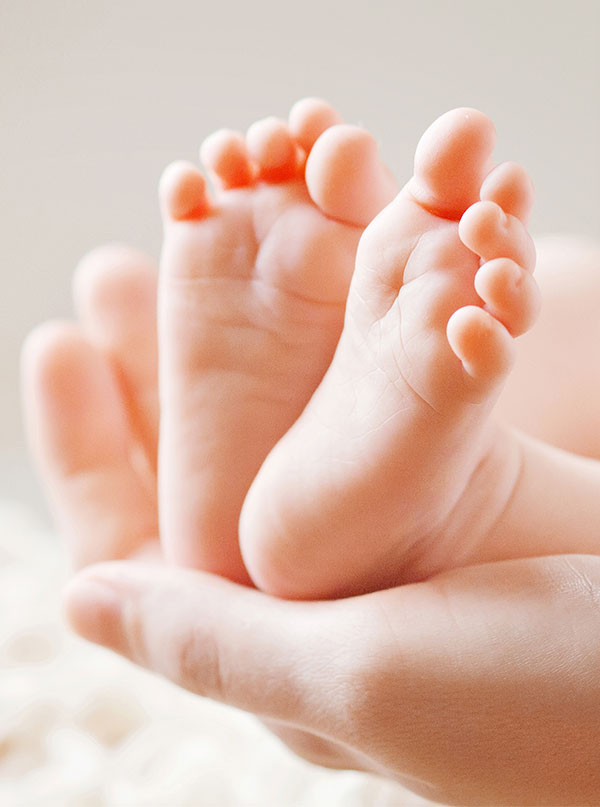Postpartum Mood Disorders
Postpartum Depression, Stress, and Anxiety
The birth of a baby is a life-changing experience that can stir up a wide range of emotions. For many new mothers, this period is filled with joy, love, and excitement. However, it’s also common to experience feelings of overwhelm, exhaustion, and anxiety. Most new moms go through what is commonly referred to as the postpartum "baby blues" after childbirth. These temporary feelings often include mood swings, crying spells, anxiety, and difficulty sleeping, which usually subside within the first two weeks after delivery.
While the baby blues are considered a normal part of the postpartum experience, some women may notice their symptoms last much longer or feel more intense. If you find that your emotions don't improve or if they worsen, you could be experiencing postpartum depression, postpartum stress, or postpartum anxiety. These conditions are more severe than the baby blues and can significantly impact your ability to care for yourself and your baby. If this sounds familiar, it's crucial to reach out for help. We encourage you to contact us, as one of our experienced therapists can provide guidance and support through this challenging time.
Understanding Postpartum Depression, Stress, and Anxiety
Postpartum depression is a form of clinical depression that can develop after childbirth. It can occur any time within the first year of having a baby, making adjusting to life as a new mom much more difficult. Common symptoms include feeling sad, hopeless, or empty for extended periods. Many moms struggling with postpartum depression also feel guilty or ashamed for not experiencing the joy they expected after their baby’s arrival.
Postpartum stress and postpartum anxiety, while less talked about than depression, can be equally debilitating. The overwhelming responsibility of caring for a newborn, sleepless nights, and changes in daily routines can create immense stress. Some mothers find themselves consumed by worry about their baby’s health, safety, or development, which can evolve into postpartum anxiety or postpartum OCD. This form of anxiety often involves obsessive thoughts or compulsions, like constantly checking on the baby or avoiding situations out of fear for the child’s well-being.

Common Symptoms of Postpartum Depression, Stress, and Anxiety
Recognizing the signs of postpartum depression, stress, or anxiety is essential. These conditions share many overlapping symptoms, but each one presents unique challenges. Here are some common signs to watch for:
- Difficulty sleeping: Beyond the typical sleep disruptions that come with caring for a newborn, you might find it hard to sleep even when your baby is resting.
- Irritability or anxiety: Feelings of being on edge or experiencing panic attacks are familiar with postpartum anxiety.
- Persistent sadness: If you feel down or hopeless most days, this could indicate postpartum depression.
- Frequent crying: If you find yourself crying often for no clear reason, this could be a sign that you are struggling emotionally.
- Lack of energy: Feeling physically and mentally drained may be a sign of both postpartum depression and stress.
- Loss of appetite: Changes in eating habits, including not feeling hungry or overeating, are common signs.
- Detachment from your baby: Not feeling connected to your baby or feeling indifferent toward them may be a symptom of postpartum depression.
- Obsessive thoughts or worry: If your mind is constantly racing with fears or you are overly fixated on your baby’s well-being, this may be postpartum anxiety.
- Weight changes: Unexplained weight gain or loss can occur with postpartum depression or anxiety.
What to Do If You're Experiencing Symptoms
It’s important to remember that postpartum depression, stress, and anxiety are not a reflection of your ability as a mother. These are severe medical conditions that require attention, and with the proper support, they can be managed effectively. If you are experiencing any of the above symptoms that persist beyond a few weeks, it’s time to seek help.
Our therapists specialize in maternal mental health and can provide a safe, supportive environment for you to express what you're going through. Whether it’s one-on-one therapy, group support, or a combination of treatments, we can help you navigate this challenging period and regain your emotional balance.
If you're struggling with postpartum depression, stress, or anxiety, please don’t hesitate to reach out. Our team in the Greater Philadelphia Area is here to help you return to feeling like yourself again.

If you are looking for counseling for Postpartum depression, stress and anxiety or have any questions about our counseling services, call us at (484) 329-7638 or request a phone consultation today. Perinatal mental health treatment is offered at both our Paoli office and via telehealth.


